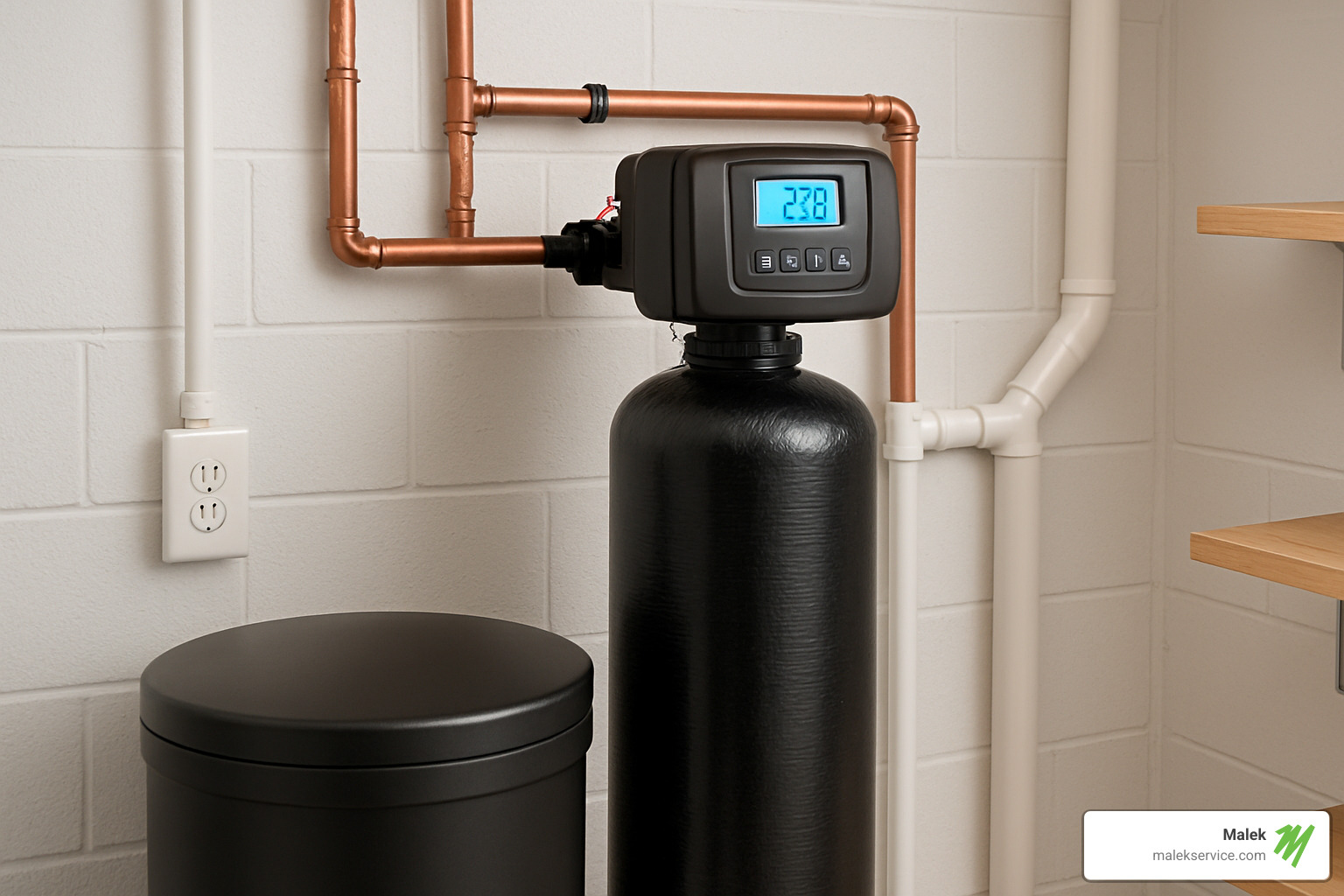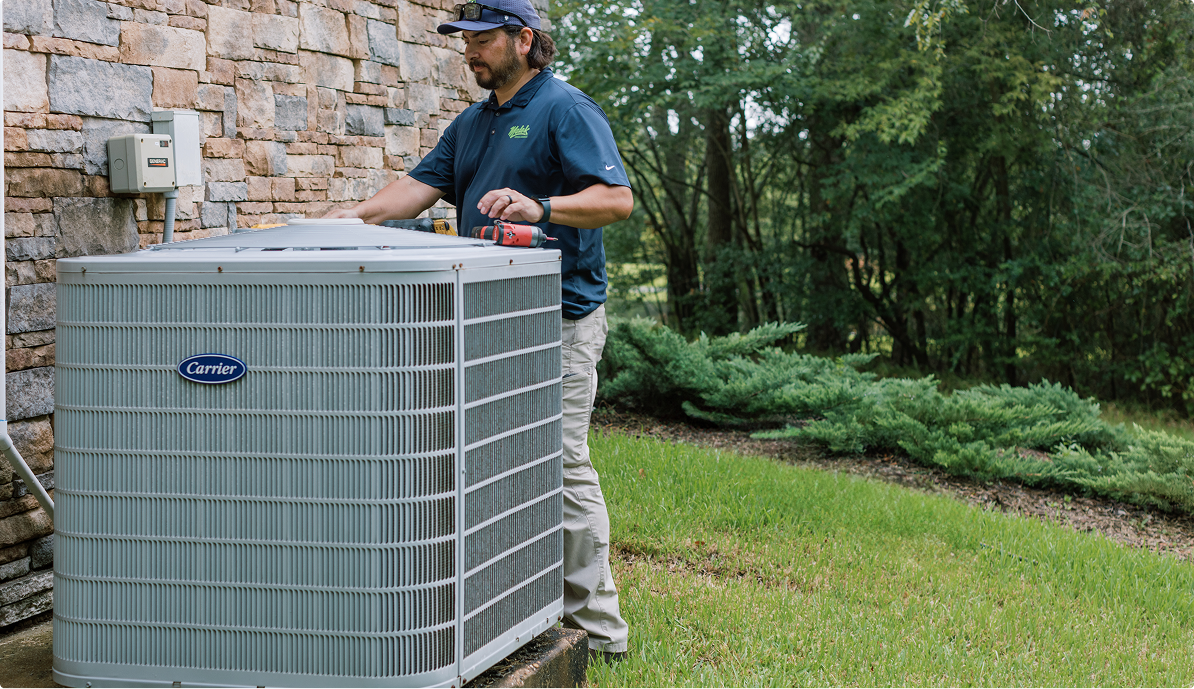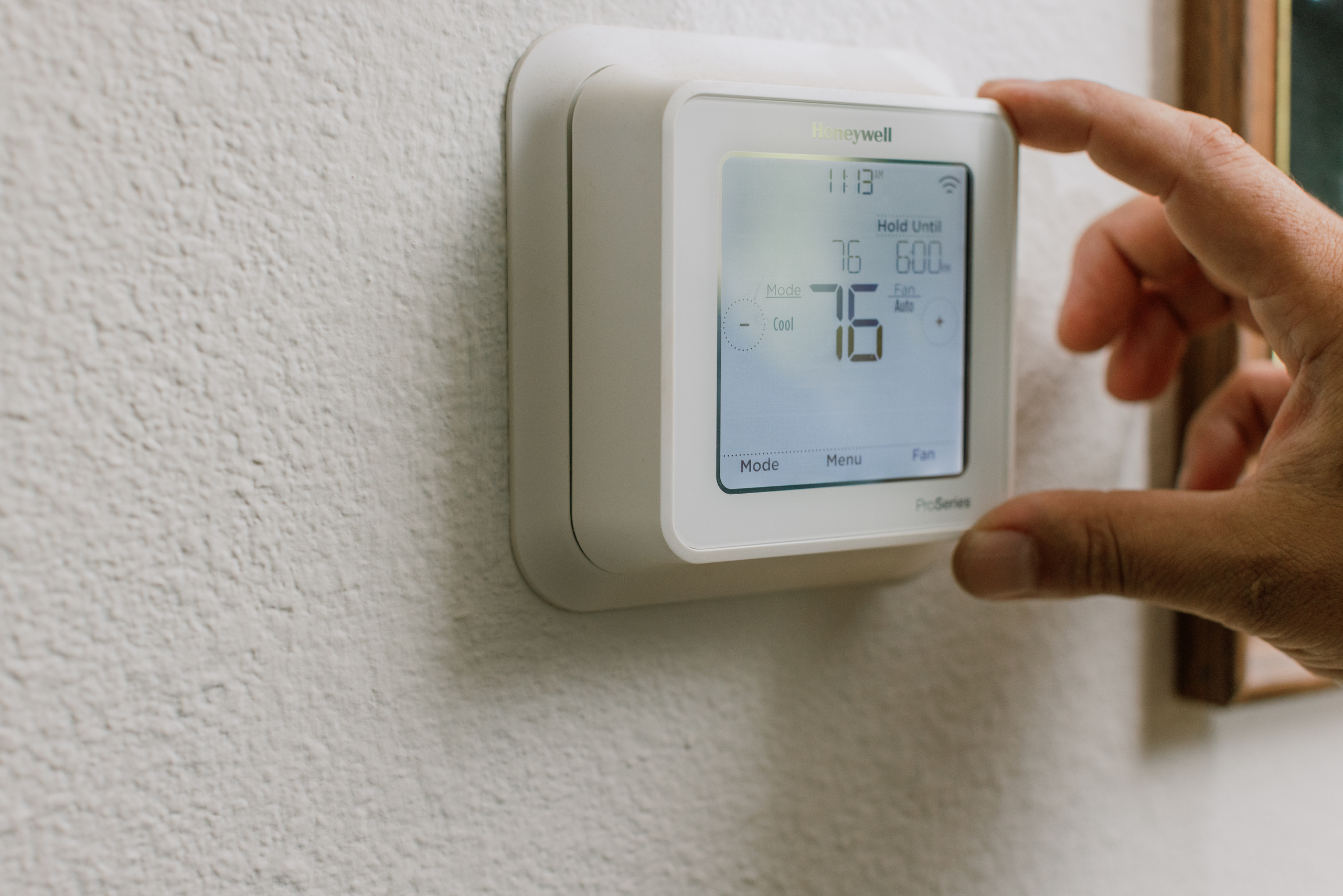Why Water Softener Systems Are Essential for Texas Homeowners
Water softener system benefits include healthier skin and hair, longer-lasting appliances, reduced energy bills, and spotless cleaning throughout your home. Here’s what you need to know:
Key Benefits at a Glance:
- Healthier skin & hair – Eliminates dryness and irritation from hard water minerals
- Protects appliances – Prevents scale buildup that damages water heaters and dishwashers
- Saves money – Reduces soap usage by 50% and energy costs by maintaining appliance efficiency
- Spotless cleaning – No more water spots on dishes or soap scum on fixtures
- Eco-friendly – Less plastic bottle waste and reduced chemical runoff
If you’ve noticed chalky buildup on your faucets, spotted dishes, or dry skin after showering, you’re dealing with hard water. Hard water affects over 85% of U.S. homes, causing mineral deposits that clog pipes, reduce appliance efficiency, and leave your skin feeling rough.
The good news? A water softener system eliminates these problems by removing calcium and magnesium through a process called ion exchange. Gas storage tank water heaters on softened water maintained their original efficiency over 15 years, while hard water caused up to 48% efficiency loss – that’s real money staying in your pocket.
I’m Courtney Zalesak, Vice President at Malek Service Company, where I’ve spent over a decade helping Texas homeowners solve their water quality challenges. Through my experience with countless water softener system benefits installations, I’ve seen how these systems transform homes from constant maintenance headaches into comfortable, efficient spaces.
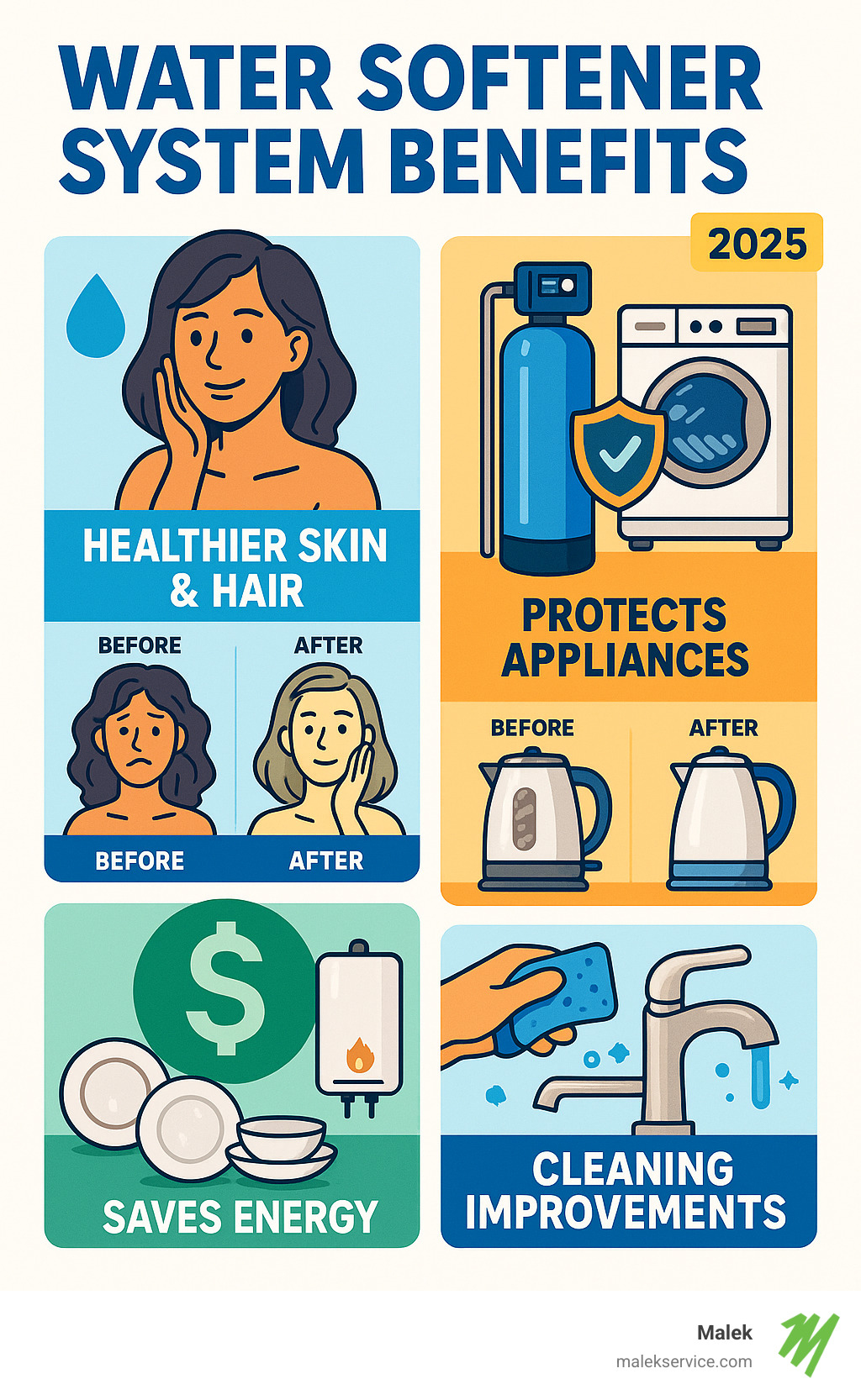
How Do Water Softener Systems Work?
Understanding how water softeners work helps you appreciate why they’re so effective. At its core, a water softener uses a process called ion exchange to swap out the troublesome minerals in hard water for harmless sodium or potassium ions.
Here’s the simple breakdown: Your water softener contains thousands of tiny resin beads with a negative charge. When hard water flows through, these beads attract and trap the positively charged calcium and magnesium ions. In return, they release sodium ions into the water – creating soft water that flows throughout your home.
Water hardness is measured in grains per gallon (gpg). Water with more than 7 grains per gallon is considered hard, while many Texas areas see hardness levels between 15-20 grains per gallon. For perspective, one grain per gallon equals about 0.002 ounces of calcium carbonate per gallon of water.
The two main types of systems are salt-based and salt-free. Salt-based systems are the most effective at true softening – they’re the only technology that actually removes hardness minerals. Salt-free systems, while marketed as “softeners,” actually condition water through processes like nucleation assisted crystallization, which prevents scale from adhering to surfaces but doesn’t remove the minerals.
Before installing any system, we recommend testing your water hardness. You can use an at-home test kit or have a professional analysis done. This helps determine the right system size and type for your specific needs. More info about stop scale
Quick Science Behind Softening
The ion exchange process happens on a molecular level. The resin beads are typically made of polystyrene and are charged with sodium or potassium ions during manufacturing. When calcium and magnesium ions encounter these beads, they’re more strongly attracted to the resin than the sodium ions, so they stick while the sodium gets released.
Eventually, the resin beads become saturated with hardness minerals and need regeneration. During this process, a concentrated salt solution (brine) flows through the system, overwhelming the resin with sodium ions. This forces the calcium and magnesium off the beads and flushes them down the drain, resetting the system for another cycle.
Most modern systems include a bypass valve that allows you to use untreated water for outdoor tasks like watering plants or washing cars, conserving salt and extending system life.
Top Water Softener System Benefits for Your Home
The water softener system benefits extend far beyond just preventing scale buildup. Independent research shows that water softeners rank among the very best household energy savers, with measurable impacts on everything from your monthly utility bills to your family’s comfort and health.
Let’s explore the specific ways a water softener transforms your daily life, backed by real data and our decades of experience serving Texas homeowners. Scientific research on energy savings
Water softener system benefits #1: Healthier Skin & Hair
Hard water is particularly harsh on your skin and hair because the minerals interfere with soap’s ability to lather properly. Instead of washing away cleanly, soap combines with calcium and magnesium to form a sticky residue that clings to your skin and hair.
This soap scum doesn’t just feel uncomfortable – it can actually worsen skin conditions. People with dermatitis, eczema, or rosacea often see significant improvement after switching to soft water because their skin can finally breathe without that mineral film blocking pores.
With soft water, you’ll notice:
- Soap lathers easily and rinses completely clean
- Skin feels softer and less dry after bathing
- Hair appears shinier and more manageable
- Reduced need for moisturizers and conditioners
- Less irritation for sensitive skin conditions
The pH balance of soft water is also gentler on your skin’s natural protective barrier. Hard water tends to be more alkaline, which can disrupt your skin’s slightly acidic pH and lead to dryness and irritation. Scientific research on dermatitis
Water softener system benefits #2: Protects Plumbing & Appliances
Scale buildup is the silent killer of household appliances and plumbing systems. Those white, chalky deposits you see on faucets are just the visible tip of the iceberg – the same buildup is happening inside your pipes, water heater, dishwasher, and washing machine.
Here’s what we see in homes with hard water:
- Showerheads lose 75% of their flow rate in less than 18 months due to mineral clogging
- Water heaters develop thick scale layers that act like insulation, forcing the heating element to work harder
- Dishwashers and washing machines fail prematurely when mineral deposits clog valves and pumps
- Pipes gradually narrow as scale accumulates, reducing water pressure throughout the house
Soft water prevents all of this damage. In fact, softened water can actually dissolve existing scale deposits, gradually restoring your plumbing system’s performance. We’ve seen 20-year-old water heaters in homes with soft water that look and perform like new units.
The flow rate improvement alone can be dramatic. Homes that switch to soft water often see immediate improvements in shower pressure and overall water flow as existing scale begins to dissolve. More info about Plumbing Maintenance
Water softener system benefits #3: Saves Money on Energy & Cleaning
The cost savings from soft water add up quickly across multiple areas of your household budget. Research shows you can reduce detergent use by up to 50% with soft water because soap and detergent work much more effectively without mineral interference.
Energy savings are equally impressive. A water heater with just 1/4 inch of scale buildup uses 25% more energy to heat the same amount of water. Gas storage tank water heaters on hard water can lose up to 48% of their efficiency over their lifetime, while those on soft water maintain their original factory efficiency rating.
Here’s a comparison of annual costs for a typical Texas household:
| Expense Category | Hard Water | Soft Water | Annual Savings |
|---|---|---|---|
| Laundry detergent | $180 | $90 | $90 |
| Dish soap | $120 | $60 | $60 |
| Water heating energy | $650 | $520 | $130 |
| Appliance repairs | $200 | $50 | $150 |
| Total Annual Savings | $430 |
Soft water also enables cold-water washing for most laundry loads. Since soap dissolves better in soft water, you can achieve the same cleaning results with cold water that previously required hot water. This protects your clothes from heat damage while cutting energy costs.
Spotless Cleaning & Brighter Laundry
One of the most immediately noticeable water softener system benefits is how much easier cleaning becomes. Without mineral interference, soap creates rich, abundant lather that actually cleans instead of forming scum.
Your dishes will come out of the dishwasher spot-free, with no cloudy film on glassware. Those stubborn water spots that required constant scrubbing? They disappear completely. Shower doors stay cleaner longer, and bathroom fixtures maintain their shine with minimal effort.
Laundry sees dramatic improvements too. Soft water allows detergent to work at full effectiveness, removing stains more completely and keeping colors brighter. Clothes feel softer and fluffier because there’s no mineral residue stiffening the fibers. White fabrics stay whiter longer, and colored items maintain their vibrancy wash after wash.
The time savings alone make soft water worthwhile. You’ll spend far less time scrubbing soap scum, polishing fixtures, and dealing with dingy laundry. Many of our customers tell us they actually enjoy cleaning again because it’s so much easier and more effective.

Eco-Friendly Household Perks
Water softeners contribute to a more environmentally friendly household in several ways. First, using 50% less soap and detergent means less chemical runoff entering our water systems. This reduces the environmental impact of your daily cleaning routines.
Soft water also reduces reliance on bottled water. Many families buy bottled water because their tap water tastes or feels unpleasant due to mineral content. With soft water that tastes clean and refreshing, you can eliminate this expense and reduce plastic waste.
The energy efficiency improvements also shrink your carbon footprint. When your water heater operates at peak efficiency and you can wash clothes in cold water, you’re using significantly less energy for daily tasks. Over time, these savings add up to meaningful environmental benefits.
Are There Any Drawbacks to Consider?
While the water softener system benefits far outweigh the drawbacks, we believe in giving you the complete picture. The most common concern is sodium content in softened water.
A properly functioning water softener adds only 75-100 mg of sodium per quart of water – that’s less than the sodium in a cup of 2% milk (116 mg) or a slice of whole wheat bread (112 mg). For most people, this amount is negligible compared to dietary sodium intake.
If you’re on a strict low-sodium diet, you have options:
- Use potassium chloride instead of sodium chloride for regeneration
- Install a reverse osmosis system at your kitchen sink for drinking water
- Keep one tap unsoftened for drinking and cooking
Other considerations include:
- Upfront installation costs ranging from $500-$2,500 depending on system type and complexity
- Ongoing salt costs of approximately $5-$25 per regeneration cycle
- Brine discharge during regeneration, though this is typically not an issue for municipal sewer systems
- Periodic maintenance including salt refills and occasional cleaning
The system requires space for installation, typically in a basement, garage, or utility room. You’ll also need access to electricity and a drain for the regeneration process. More info about Malek’s Plumbing Services
Choosing & Maintaining Your Water Softener in Texas
Selecting the right water softener starts with understanding your specific water conditions and household needs. Texas water varies significantly by region – areas near Houston might have different hardness levels than those around College Station or Huntsville.
The average person uses 75 gallons of water per day, so a family of four typically needs a system that can handle 300 gallons daily. You’ll also need to factor in your water’s hardness level. A family of four with 15 grains per gallon hardness needs a system that can remove about 4,500 grains per day.
System capacity is measured in grains removed between regenerations. Common residential sizes include:
- 24,000 grains for small households
- 32,000-40,000 grains for average families
- 48,000+ grains for large households or very hard water
Quality salt matters for system longevity. We recommend high-purity evaporated salt pellets over rock salt, which contains impurities that can clog your system. Solar salt is a good middle-ground option that balances cost and purity.
Professional installation ensures proper sizing, code compliance, and warranty protection. Most quality water softeners last 10-20 years with proper maintenance, making them an excellent long-term investment. More info about Houston Water Softeners
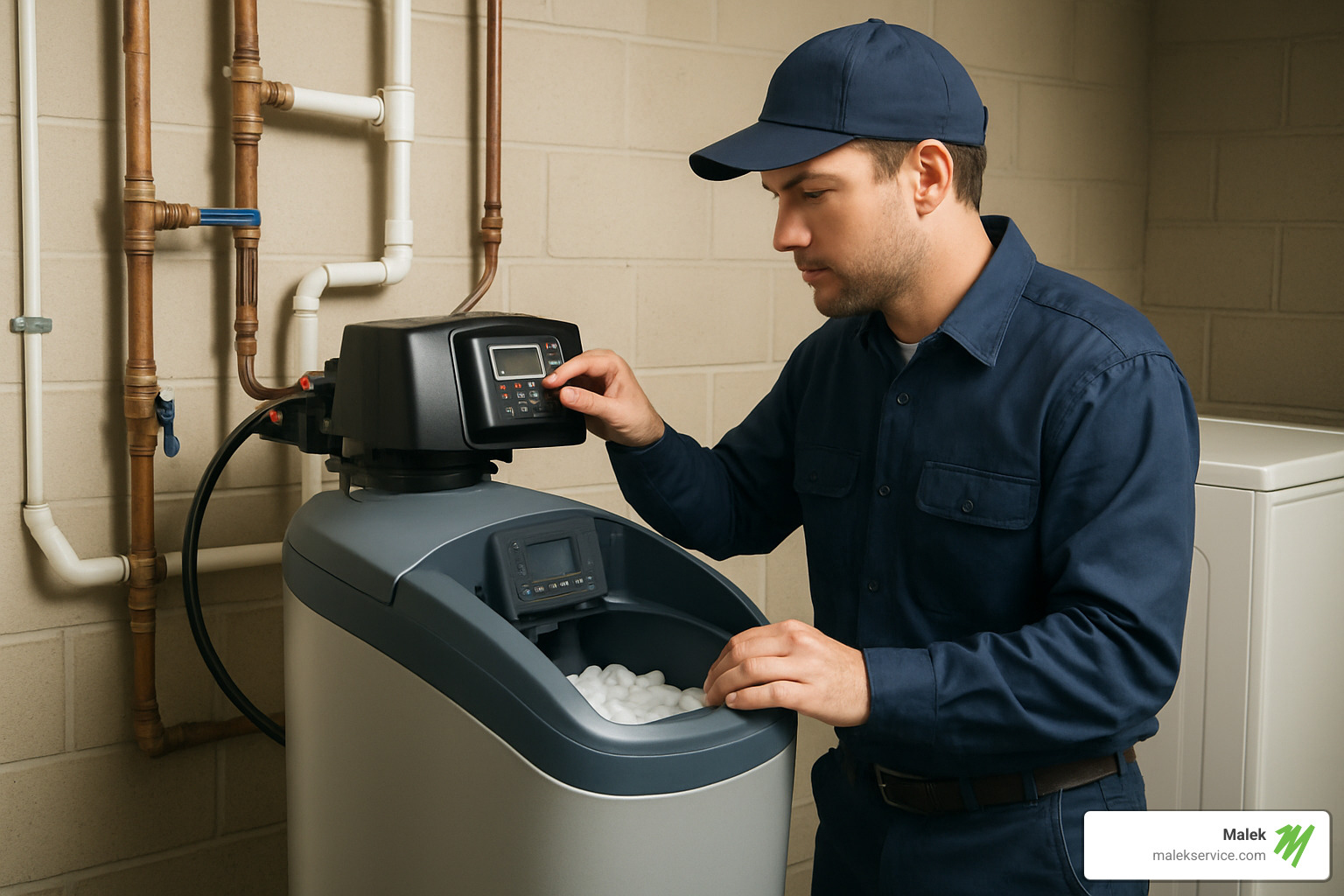
Finding “Water Softener Installation Near Me”
When searching for “water softener installation near me,” you want licensed professionals who understand local water conditions and building codes. At Malek Service, we’ve been serving Texas communities for years, and we know the specific challenges homeowners face in areas like College Station, Houston, Brenham, and Huntsville.
Professional installation includes:
- Water testing to determine exact hardness levels and other contaminants
- Proper sizing based on your household’s actual water usage
- Code-compliant installation that meets local plumbing standards
- System setup and programming for optimal performance
- Warranty protection that covers both parts and labor
We provide free estimates and can often complete installation in a single day. Our licensed technicians receive regular training on new technology, ensuring you get the most advanced and efficient system for your needs. More info about Water Softener Installation Near Me
Simple Maintenance Tips
Maintaining your water softener is straightforward with these simple steps:
Monthly checks:
- Monitor salt levels in the brine tank – keep it about half full
- Look for salt bridges (hard crust) that can prevent proper regeneration
- Check for salt mushing (thick paste at the bottom of the tank)
Quarterly maintenance:
- Clean the brine tank if you notice salt buildup
- Inspect the system for leaks or unusual noises
- Verify the bypass valve operates properly
Annual professional service:
- Complete system inspection and cleaning
- Resin bed sanitization if needed
- Programming adjustments based on water usage changes
- Replacement of any worn components
Breaking salt bridges is easy – just tap the crust with a broom handle to break it up, then run a regeneration cycle. If you find salt mushing, you’ll need to empty the tank, clean it thoroughly, and refill with fresh salt.
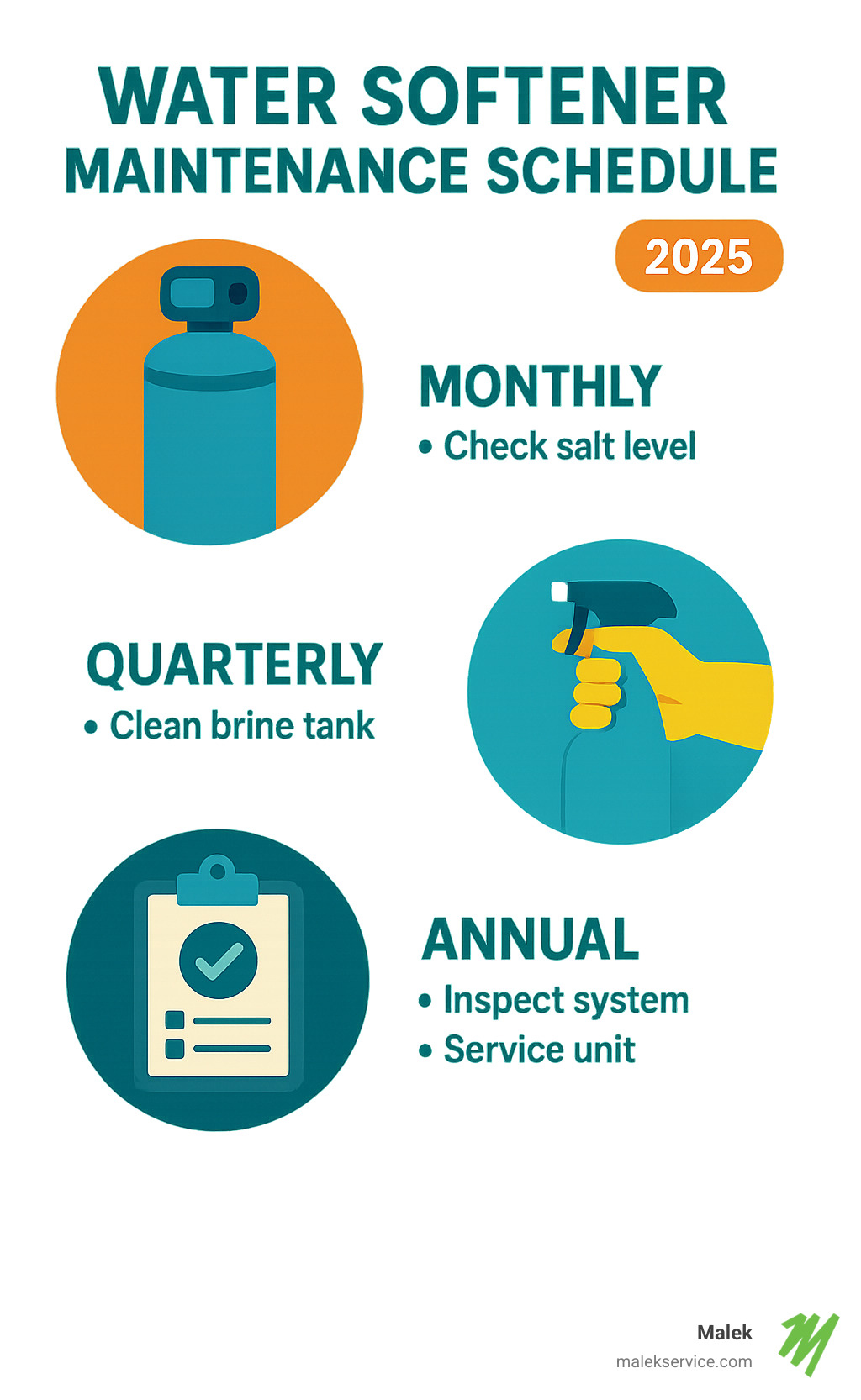
Frequently Asked Questions about Water Softener System Benefits
Let’s address the most common questions we hear about water softener system benefits and address any concerns you might have.
Does soft water add too much sodium?
No, soft water adds minimal sodium to your diet. A typical glass of softened water contains only about 12.5 mg of sodium, compared to 211 mg in a slice of whole wheat bread. For comparison, the American Heart Association recommends limiting sodium intake to 2,300 mg per day – you’d need to drink over 180 glasses of softened water to reach that limit from water alone.
If you’re on a medically restricted low-sodium diet, consult your physician. You can also use potassium chloride instead of sodium chloride for regeneration, or install a reverse osmosis system for drinking water.
How long does a softener last?
A quality water softener typically lasts 10-20 years with proper maintenance. The resin beads can handle thousands of regeneration cycles, and the control valve and other components are built for long-term use. We’ve seen well-maintained systems operate effectively for over two decades.
Factors affecting lifespan include:
- Water quality and hardness level
- System quality and proper sizing
- Regular maintenance and salt quality
- Professional installation and setup
Can I pair it with a filtration system?
Absolutely! Water softeners and filtration systems complement each other perfectly. A softener removes hardness minerals, while filtration systems remove sediment, chlorine, and other contaminants. Many homeowners install both for comprehensive water treatment.
The typical setup places the softener first to protect downstream filtration equipment from scale buildup. You might add:
- Sediment filters for sand and rust removal
- Carbon filters for chlorine and taste improvement
- Reverse osmosis systems for ultra-pure drinking water
- UV sterilizers for bacterial protection
Conclusion
The water softener system benefits we’ve explored – from healthier skin and hair to significant energy savings – make these systems one of the smartest investments you can make for your Texas home. With potential annual savings of $400+ and a system lifespan of 10-20 years, the return on investment is clear.
Beyond the financial benefits, there’s the daily comfort of softer skin, cleaner dishes, brighter laundry, and appliances that work like new for years longer. You’ll spend less time cleaning, use fewer harsh chemicals, and enjoy water that actually tastes good.
At Malek Service, we’ve helped thousands of Texas homeowners transform their water quality. Our experienced, licensed technicians understand the unique challenges of Texas water and can design the perfect solution for your specific needs. Whether you’re in College Station, Houston, Brenham, or any of the communities we serve, we’re here to deliver worry-free soft water for years to come.
Ready to experience these benefits for yourself? Contact us today for a free water analysis and estimate. More info about services
Your home deserves the best, and soft water is one of those improvements that pays dividends every single day. From the moment you step into your first soft water shower, you’ll wonder why you waited so long to make the switch.
